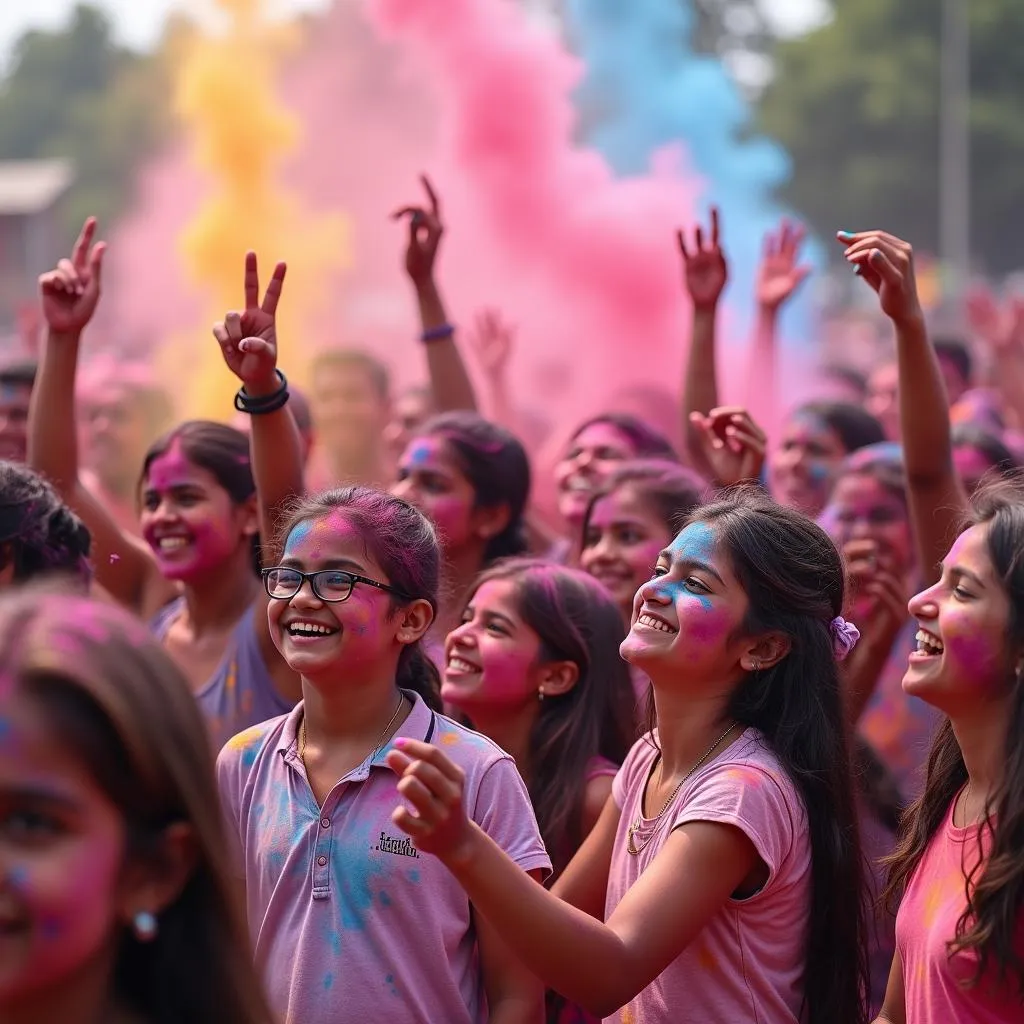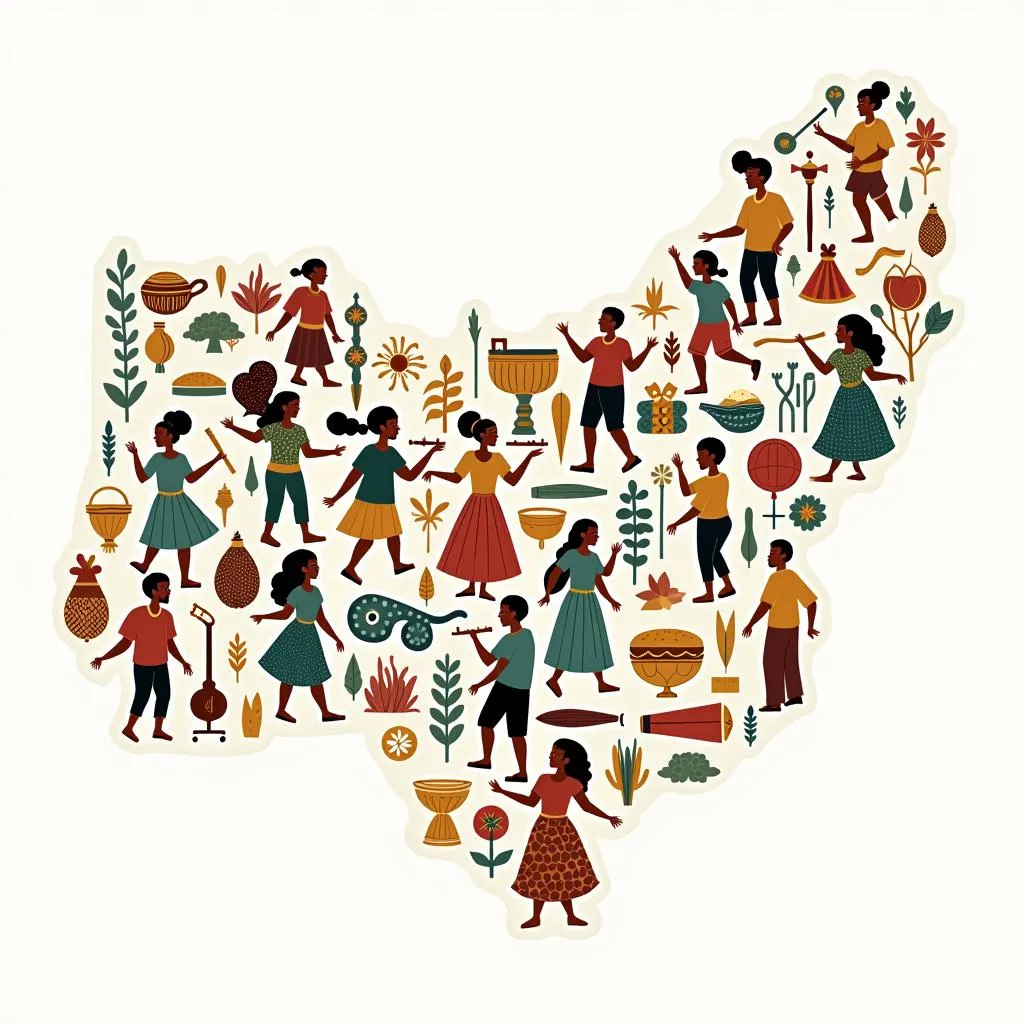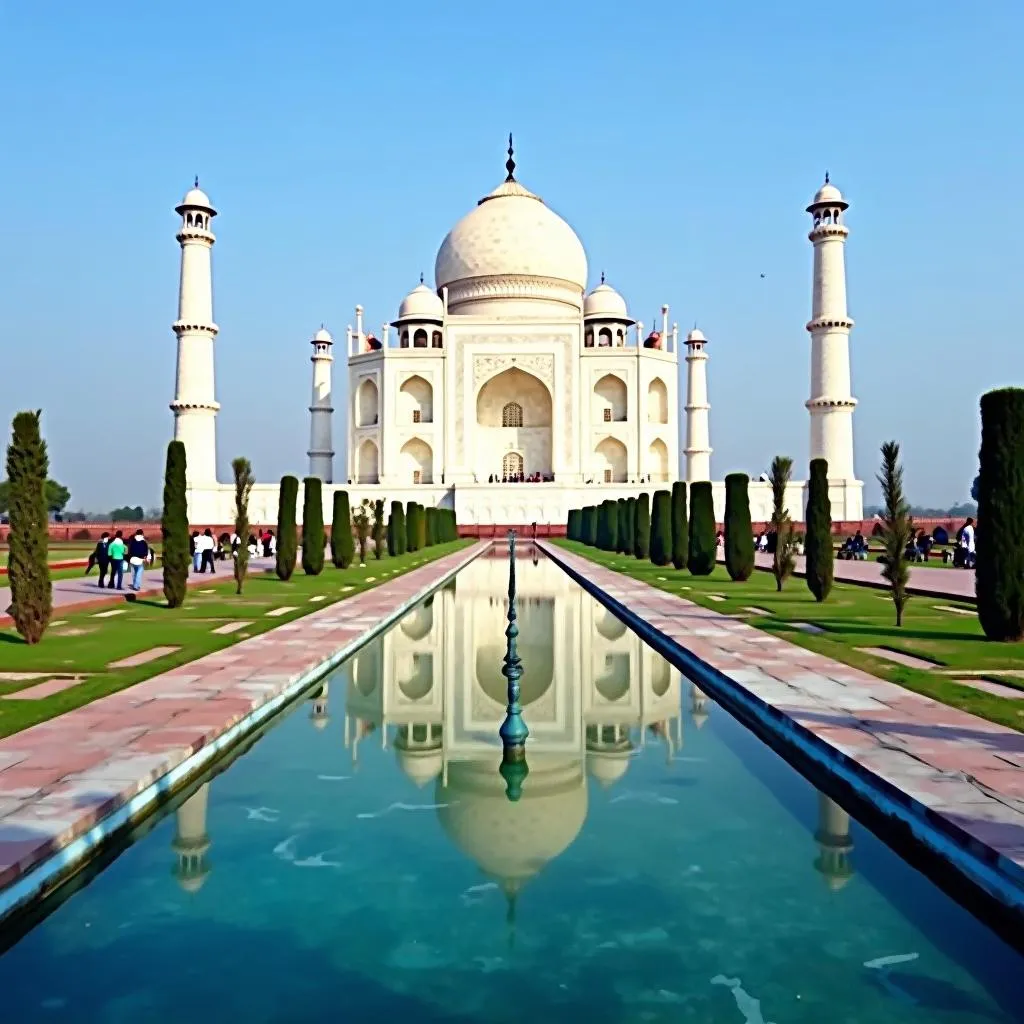The IELTS Speaking test often includes questions about cultural activities, making it a crucial topic for test-takers to prepare for. This article will guide you through answering questions related to describing a cultural activity you participated in, providing sample answers and valuable tips to help you achieve a high band score.
Nội dung bài viết
- Part 1: Introduction and Interview
- Question: Do you enjoy participating in cultural activities?
- Question: What types of cultural activities are popular in your country?
- Part 2: Long Turn
- Cue Card:
- Follow-up Questions:
- Part 3: Two-way Discussion
- Question: How do cultural activities contribute to a society’s identity?
- Question: In what ways can governments promote and preserve cultural activities?
- Key Vocabulary and Phrases for High Scores
- Examiner’s Advice
Describe a time when you participated in a cultural activity is a common topic in IELTS Speaking tests. It allows examiners to assess your ability to discuss personal experiences, cultural awareness, and language proficiency. Let’s explore how to tackle this topic effectively across all parts of the IELTS Speaking test.
Part 1: Introduction and Interview
In this section, the examiner may ask general questions about cultural activities. Here are some potential questions and sample answers:
Question: Do you enjoy participating in cultural activities?
Sample Answer (Band 7-8):
“Absolutely! I find cultural activities fascinating and enriching. They provide a unique opportunity to broaden my horizons and gain insights into different traditions and ways of life. Whether it’s attending a traditional festival or trying out a new craft, I always feel like I’m learning something valuable about the world around me.”
Question: What types of cultural activities are popular in your country?
Sample Answer (Band 8-9):
“In my country, we have a diverse range of popular cultural activities. One of the most significant is our annual Harvest Festival, which showcases traditional dances, music, and culinary delights from various regions. Additionally, calligraphy workshops and tea ceremonies are gaining popularity, especially among younger generations who are keen to reconnect with our cultural roots. These activities not only preserve our heritage but also foster a sense of community and national pride.”
Part 2: Long Turn
For this section, you’ll be given a cue card with a topic to speak about for 1-2 minutes. Here’s a sample cue card related to describing a cultural activity:
Cue Card:
Describe a cultural activity you participated in
You should say:
- What the activity was
- When and where you participated in it
- Who you were with
- And explain how you felt about participating in this activity
Sample Answer (Band 8-9):
“I’d like to talk about my experience participating in the Holi Festival, which is a vibrant and colorful celebration in India. I had the opportunity to take part in this exhilarating cultural event last year during my visit to Mumbai in March.
The Holi Festival, also known as the Festival of Colors, is a joyous occasion that marks the arrival of spring and the triumph of good over evil. It’s characterized by people throwing colored powders and water at each other, creating a kaleidoscope of hues in the streets.
I was fortunate enough to celebrate Holi with some local friends I had made during my stay. We gathered early in the morning in a large open area where hundreds of people had already assembled. The atmosphere was electric with excitement as everyone prepared for the festivities to begin.
As the celebration kicked off, I found myself completely immersed in the experience. The air was filled with laughter and music as people of all ages enthusiastically doused each other with vibrant colors. I was initially a bit hesitant, but my friends encouraged me to fully embrace the spirit of the festival.
Participating in Holi was an incredibly liberating and eye-opening experience. It was fascinating to witness how this cultural tradition brought people together, breaking down social barriers and fostering a sense of unity. The sheer joy and uninhibited celebration were contagious, and I found myself laughing and dancing along with strangers who quickly became friends.
What struck me most was the sense of community and inclusivity that permeated the entire event. Everyone, regardless of their background, was welcome to join in the festivities. It was a powerful reminder of how cultural activities can bridge divides and create shared experiences that transcend language and cultural differences.
Overall, participating in the Holi Festival was an unforgettable experience that left me with a deeper appreciation for Indian culture and traditions. It broadened my perspective on the importance of preserving and celebrating cultural heritage, and I’m incredibly grateful for the opportunity to have been a part of such a meaningful and joyous occasion.”
 IELTS Speaking: Describing Holi Festival participation
IELTS Speaking: Describing Holi Festival participation
Follow-up Questions:
- How did this experience change your perspective on cultural activities?
Sample Answer (Band 8-9):
“This experience profoundly impacted my perspective on cultural activities. It made me realize that participating in such events is not just about observing traditions, but about actively engaging with different cultures and fostering cross-cultural understanding. The Holi Festival demonstrated the power of cultural activities to bring people together, transcending social and cultural boundaries. It ignited a passion in me to seek out and participate in more diverse cultural experiences, as I now see them as invaluable opportunities for personal growth and building global connections.”
- Do you think it’s important for people to participate in cultural activities from other countries?
Sample Answer (Band 8-9):
“Absolutely, I believe it’s crucial for people to participate in cultural activities from other countries. Such experiences broaden our horizons and challenge our preconceptions, leading to greater empathy and understanding between different cultures. Engaging in diverse cultural activities helps us develop a more nuanced worldview and appreciate the richness of human diversity. Moreover, it can foster international cooperation and mitigate cultural misunderstandings, which is increasingly important in our globalized world. Ultimately, participating in cultural activities from other countries is a powerful tool for promoting peace and mutual respect among different societies.”
Part 3: Two-way Discussion
In this section, the examiner will ask more abstract questions related to the topic. Here are some potential questions and sample answers:
Question: How do cultural activities contribute to a society’s identity?
Sample Answer (Band 8-9):
“Cultural activities play a pivotal role in shaping and maintaining a society’s identity. They serve as a tangible expression of a community’s values, beliefs, and historical experiences. These activities, whether they’re traditional festivals, artistic performances, or culinary practices, act as a bridge between the past and present, preserving heritage while allowing for evolution and adaptation.
Moreover, cultural activities foster a sense of belonging and collective identity among members of a society. They provide shared experiences that bind people together, creating a common narrative and strengthening social cohesion. This is particularly important in today’s globalized world, where societies are becoming increasingly diverse.
Furthermore, cultural activities often serve as a source of pride and distinctiveness for a society. They can showcase a community’s unique attributes to the world, promoting cultural exchange and understanding. This not only enhances a society’s self-image but also contributes to its soft power on the global stage.
However, it’s important to note that cultural activities should not be seen as static or unchanging. They evolve over time, reflecting societal changes and incorporating new influences. This dynamic nature allows cultural activities to remain relevant and meaningful to new generations, ensuring the continuity of cultural identity while allowing for growth and adaptation.”
 Cultural activities shaping society's identity
Cultural activities shaping society's identity
Question: In what ways can governments promote and preserve cultural activities?
Sample Answer (Band 8-9):
“Governments can play a crucial role in promoting and preserving cultural activities through a variety of strategic approaches. Firstly, they can implement policies and legislation that protect cultural heritage sites, traditional practices, and artistic expressions. This might include laws that safeguard indigenous languages, traditional crafts, or historically significant locations.
Financial support is another key area where governments can make a significant impact. By allocating funds for cultural programs, museums, and festivals, they can ensure the continuation and development of various cultural activities. This could involve grants for artists, subsidies for cultural institutions, or funding for community-based cultural initiatives.
Education is also a powerful tool for cultural preservation. Governments can integrate cultural studies into school curricula, promoting awareness and appreciation of local traditions from an early age. They can also support adult education programs and workshops that teach traditional skills and practices.
Furthermore, governments can leverage technology to document and disseminate cultural knowledge. This might involve creating digital archives of cultural artifacts, supporting the development of apps that teach traditional languages, or using social media to promote cultural events.
Describe a project you worked on with friends could be an interesting way for governments to engage youth in cultural preservation efforts. By encouraging collaborative projects that explore and reimagine cultural traditions, governments can ensure that younger generations feel connected to their cultural heritage.
Lastly, governments can foster international cultural exchange through diplomatic initiatives, cultural tourism programs, and participation in global cultural events. This not only promotes the country’s culture abroad but also encourages cultural diversity and understanding at home.
By employing these multifaceted approaches, governments can create an environment where cultural activities are valued, preserved, and allowed to thrive, ensuring that they remain an integral part of society for generations to come.”
Key Vocabulary and Phrases for High Scores
To achieve a high band score in IELTS Speaking, it’s crucial to use a range of sophisticated vocabulary and expressions. Here are some key terms and phrases that can elevate your responses:
-
Immerse oneself in /ɪˈmɜːs/ (phrasal verb): To become completely involved in something.
Example: “I love to immerse myself in different cultures when I travel.” -
Broaden one’s horizons /ˈbrɔːdn ˈhɒraɪznz/ (idiom): To expand one’s range of experiences, knowledge, or interests.
Example: “Participating in cultural activities helps broaden one’s horizons.” -
Foster /ˈfɒstə(r)/ (verb): To encourage the development of something.
Example: “These events foster a sense of community among participants.” -
Profound impact /prəˈfaʊnd ˈɪmpækt/ (noun phrase): A very significant or deep effect.
Example: “The festival had a profound impact on my understanding of the local culture.” -
Transcend /trænˈsend/ (verb): To go beyond the usual limits of something.
Example: “The joy of the celebration seemed to transcend language barriers.” -
Kaleidoscope /kəˈlaɪdəskəʊp/ (noun): A constantly changing pattern or sequence of elements.
Example: “The festival was a kaleidoscope of colors, sounds, and emotions.”
Describe a festival you enjoyed celebrating can be an excellent opportunity to use these advanced vocabulary items in context, demonstrating your language proficiency to the examiner.
Examiner’s Advice
To excel in the IELTS Speaking test when describing cultural activities:
-
Practice regularly: Familiarize yourself with various cultural topics and practice describing them in detail.
-
Use personal experiences: Incorporate genuine experiences to make your answers more authentic and engaging.
-
Employ a range of vocabulary: Utilize sophisticated words and phrases relevant to cultural discussions.
-
Structure your answers: Organize your thoughts logically, especially in Part 2, to ensure coherence.
-
Show cultural awareness: Demonstrate understanding of cultural significance and impacts on society.
-
Be fluent and natural: Aim for smooth delivery without excessive pauses or hesitations.
-
Expand on your answers: Provide explanations and examples to fully develop your ideas.
Describe a local market that you often visit can be an excellent topic to practice these skills, as it combines cultural elements with personal experiences.
By following these guidelines and incorporating the sample answers and vocabulary provided, you’ll be well-prepared to discuss cultural activities confidently in your IELTS Speaking test. Remember, the key is to practice regularly and describe a place you visited that you would like to go back to using these techniques to enhance your overall speaking performance.


